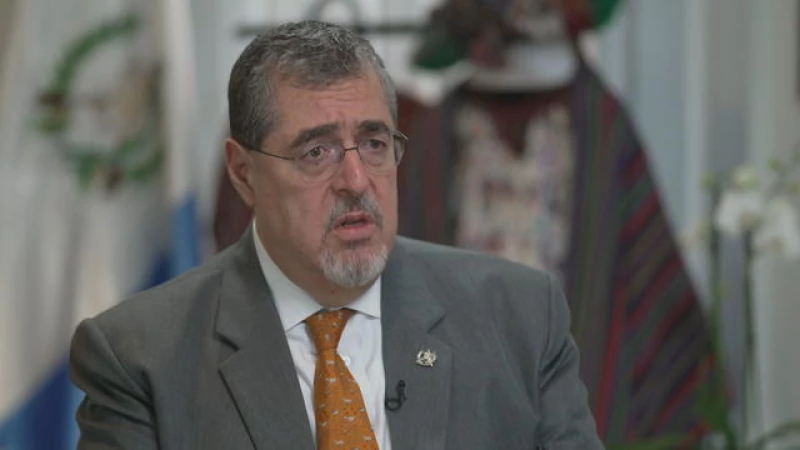Migration Trends Continue Despite Vice President's Pleas
Washington — Nearly three years ago, Vice President Kamala Harris stood alongside the then-president of Guatemala in his palace and delivered a message to would-be migrants: "Do not come" to the United States.
Her pleas didn't work. Since June 2021, when Harris made those remarks, U.S. officials have tallied 709,305 encounters with migrants from Guatemala along the southern border, according to government data. More than 2 million migrants of all nationalities are expected to be apprehended along the border by the end of this fiscal year in September, which would be the third straight year of sustained foot traffic across the span.
Asked this week whether migrants have heeded Harris' request from three years ago, Guatemala's new president, Bernardo Arévalo, shrugged his shoulders and said, "Well, I don't know. You do the numbers."
Arévalo, who took office in January, came to Washington this week to meet with President Biden and Harris as the White House hopes to demonstrate progress on addressing border security and immigration, issues that remain top voter concerns.
During a brief Oval Office exchange captured by White House photographers, Arévalo described the president as "enchanting" and "very warm" to CBS News. However, in longer meetings with Harris, he emphasized that Guatemala needs more U.S. economic investment to deter migration, rather than relying solely on American relief funded by taxpayers.
Arévalo expressed, "Cooperation is not sending money. Cooperation can be by creating conditions in which we can invite you to invest in Guatemala and establish factories, work that can begin to produce and create jobs. That's fundamentally what we are most interested in."
He continued, "We have to work to allow people, what we call, 'The right to stay.' People have a right to remain in their places. People need to find opportunities."
Tasked by Mr. Biden to address the "root causes" of migration, Harris faces the challenge following a surge in illegal border crossings after the previous administration's strict border policies. With another busy spring anticipated along the U.S.-Mexico border, the Biden administration is considering executive action if Congress does not enact a bipartisan plan negotiated by senators last year, as per officials speaking to CBS News.
As she personally wades back into the politically tricky issue, Harris on Monday announced another $170 million in economic development and security assistance for Guatemala. Arévalo welcomed the investments as a long-term solution to preventing his country's citizens from leaving and signaled he'd prefer to see that kind of cooperation continue. But he also did not discount the possibility of working with a second Trump administration.
"We are looking forward to working with whoever wins in the next election to support and work so that our citizens that are residents in the United States enjoy full rights," Arévalo said.
Asked whether he thought Trump's preference for border walls works, he said, "I think that history shows they don't. What we need to look for is integrated solutions to a problem that is far more complex than just putting a wall to try to contain."
"Corruption is the most urgent problem"
Arévalo, 65, is a former diplomat and sociologist and the son of the late former Guatemalan president Juan José Arévalo, who was the country's first democratically elected president from 1945 to 1951.
The younger Arévalo took office in January after running an underdog campaign on an anti-corruption platform and defeating several better-known, better-funded opponents backed by the country's political and economic elite. His victory effectively put an end to the country's long standing conservative political establishment. But rivals who control the country's judiciary continue to try prosecuting him and his political party, accusing them of rigging the results of last year's elections — accusations he strongly disputes.
"Corruption is the most pressing issue," Arévalo expressed to CBS News. "However, development is the most crucial problem. Without tackling corruption, we cannot achieve the necessary development for people to thrive and remain."
Arévalo, in his efforts to reform Guatemala's government and reinstate democratic principles, voiced his support for the release of journalist José Rubén Zamora. Zamora was handed a six-year prison sentence in 2023 on money laundering charges during the former President Alejandro Giammattei's tenure.
"El Periódico," Zamora's newspaper, extensively covered corruption within the Giammattei administration. Following Zamora's arrest, the newspaper was forced to cease operations due to financial constraints and its journalists fleeing the country to evade prosecution. Zamora's situation has garnered global attention and condemnation from international press freedom organizations.
"We are hopeful for his prompt release," Arévalo expressed regarding Zamora.
During his Inauguration Day, Arévalo dispatched the head of the nation's prison system to improve the harsh conditions in which Zamora was detained. While the president advocates for the journalist's freedom, Arévalo could not provide a specific release date due to his lack of authority over Guatemala's judiciary as per the Guatemalan Constitution.
"We understand that the allegations lack credibility," he remarked. "However, we are unable to intervene in the Court of Justice, hence we are uncertain."







